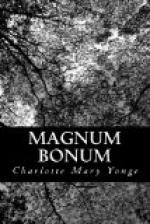“You think you must explain it to my uncle, mother,” said Allen, rather ruefully.
“Certainly. He ought to be told first, and Mr. Ogilvie next. Depend upon it, he will be far less angry if it is freely confessed and put into his hands and what is more important, Mr. Barnes must attend to him, and acquit the Richardses.”
The general voice agreed, but Rob writhed and muttered, “Can’t you be the one to tell him, Mother Carey?”
“That’s cool,” said Allen, “to ask her to do what you’re afraid of.”
“He couldn’t do anything to her,” said Rob.
However, public opinion went against Rob, and the party of boys dragged him off in their train the less reluctantly that Allen would be spokesman, and he always got on well with his uncle. No one could tell how it was, but the boy had a frank manner, with a sort of address in the manner of narration, that always went far to disarm displeasure, and protected his comrades as well as himself. So it was that, instead of meeting with unmitigated wrath, the boys found that they were allowed the honours and graces of voluntary confession. Allen even thought that his uncle showed a little veiled appreciation of the joke, but this was not deemed possible by the rest.
To exonerate young Richards was the first requisite, and Allen, under his uncle’s eye, drew up a brief note to this effect:-
“SIR,-We beg to apologise for the mischief
done in your grounds, and
to assure you on our word and honour that it was suggested
by no one,
that no one admitted us, and no one had any share
in it except
ourselves.
“ALLEN
BROWNLOW.
“ROBERT
FRIAR BROWNLOW.
“ROBERT
OTWAY BROWNLOW.
“JOHN
FRIAR BROWNLOW.
“JOHN
LUCAS BROWNLOW.”
This letter was taken up the next morning to Belforest by Colonel Brownlow, and the two eldest delinquents, one, curious, amused, and with only compunction enough to flavour an apology, the other cross, dogged, and sheepish, dragged along like a cur in a sling, “just as though he were going to be hanged,” said Janet.
The report of the expedition as given by Allen was thus:-"The servant showed us into a sort of anteroom, and said he would see whether his master would see us. Uncle Robert sent in his card and my letter, and we waited with the door open, and a great screen in front, so that we couldn’t help hearing every word. First there was a great snarl, and then a deferential voice, ’This alters the case, sir.’ But the old man swore down in his throat that he didn’t care for Colonel Brownlow or Colonel anybody. ’A gentleman, sir; one of the most respected.’ ‘Then he should bring up his family better.’ ’Indeed, sir, it might be better to accept the apology. This might not be considered actionable damage.’ ‘We’ll see that!’




